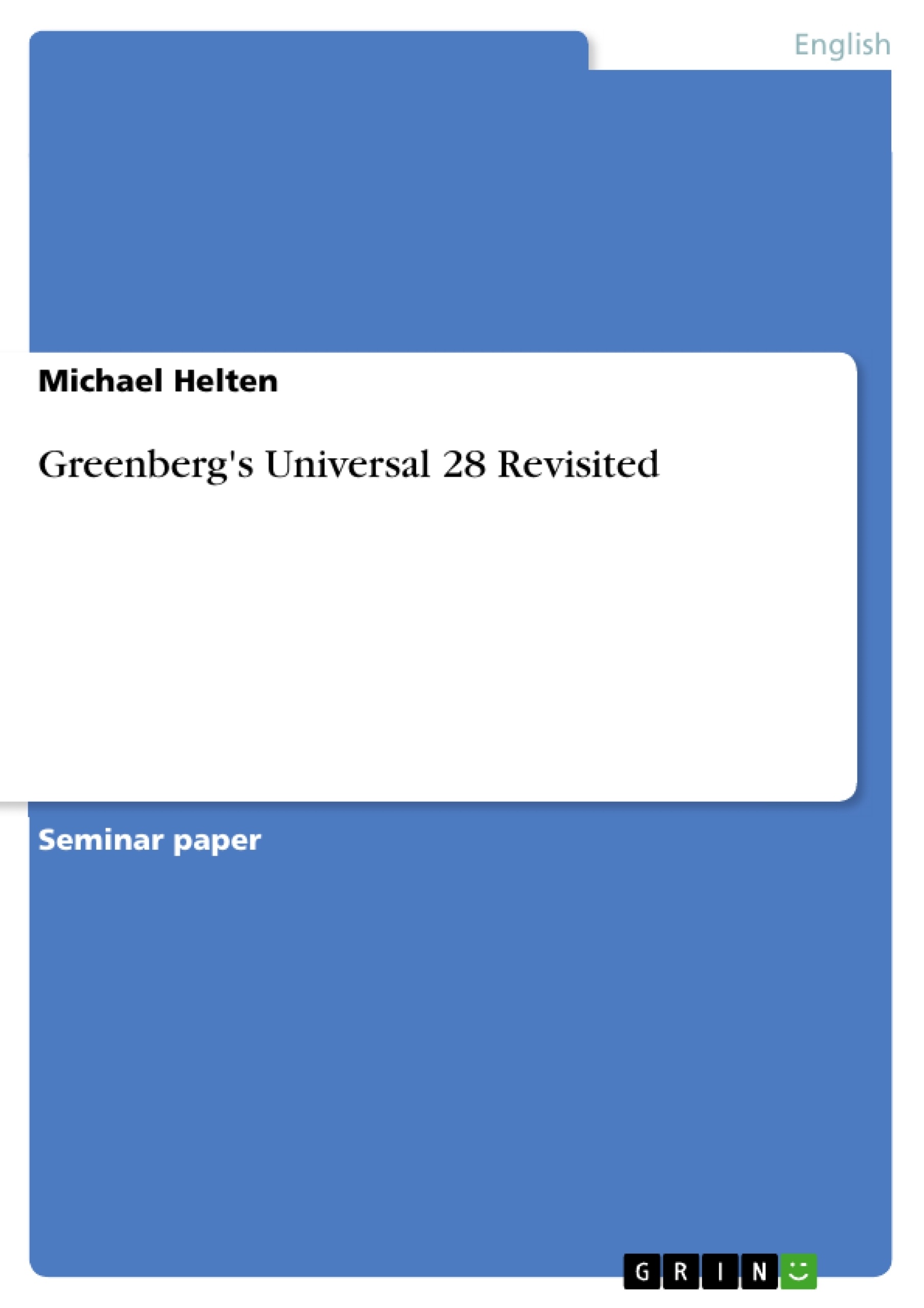As one of its most important theories, Functional Typology (FT) is a highly empirical approach to all fields of linguistics. Joseph Greenberg of Stanford University, the classic representative of FT, wrote Language Universals, the seminal work that constituted FT, in 19661. FT is called typology because it classifies languages into types according to their features as opposed to generic classifications that group languages according to their language families. It is called functional because it searches for universal tendencies in languages based on the assumption that these tendencies are brought about by the need to fulfill certain functions in communication. FT is thereby the counter approach to Generative Grammar (Functionalism), which assumes that there is a Universal Grammar every human is born with. As a result of trying to find universal categories of linguistic behavior, functional typologists try to extract valid principles by synchronic empirical testing and generalizations. They call these extracted principles universals. One of these universals is Universal 28:
Universal 28: If both the derivation and inflection follow the root, or they both precede the root, the derivation is always between the root and the inflection.
According to this Greenbergian universal, we should expect never to see a case in which a root is followed first by an inflectional and then by a derivational suffix. It also excludes cases in which a root is directly preceded by an inflectional prefix which is preceded by a derivational prefix in turn. There appear to be a number of such cases in different languages, however. The goal of this paper is to examine in how far Universal 28 can be saved in view of the cases that have been brought forth in the literature to contradict it. Crucial to this examination will be to first clarify the differences between the central terms ‘inflection’ and ‘derivation’, and how the two interact.
Inhaltsverzeichnis (Table of Contents)
- Introduction
- Inflection vs. derivation
- Inflection never changes the syntactic category of a word, derivation may change it.
- IM is relevant to the syntax, DM is not.
- Inflection is obligatory; derivation is optional.
- Inflection does not change the core lexical meaning, derivation does.
- IM is more abstract than DM.
- IM is not restricted by arbitrary limitations, DM is.
- → IM is more productive.
- IM categories may be expressed cumulatively.
- DM can be semantically irregular, IM is semantically regular.
- DM is more relevant to the base than IM.
- DM can be reapplied; IM cannot be reapplied.
- Derived lexemes are more likely to be stored in the lexicon than inflected forms.
- Inflection is always peripheral with respect to derivation.
- Four theories of seeing inflection and derivation interact
- The dichotomy approach
- The SLH (Strong Lexicalist Hypothesis)
- The continuum approach
- A tripartition
- What motivates Universal 28?
- Counterexamples to Universal 28
- Of passers-by and hangers-around
- Suppletive comparative stems
- Regular comparative stems
- Productive cases of inflection followed by derivation
- Kinderchen and other diminutives of plurals
- Yiddish adverbs - bislexvayz problematic
- Of Äpfelsäfte and heroesisms
- Georgian preverbs
- Tagalog moderative verbs
- Conclusion
Zielsetzung und Themenschwerpunkte (Objectives and Key Themes)
This paper aims to explore the validity of Universal 28, a principle proposed by Joseph Greenberg within the framework of Functional Typology. The paper examines various cases presented in the literature that seem to contradict this universal, focusing on the distinction between inflection and derivation and their interactions.- The distinction between inflection and derivation.
- The interaction of inflection and derivation.
- Counterexamples to Universal 28.
- Potential modifications to Universal 28 to account for the observed counterexamples.
- The broader theoretical implications of Universal 28 and its potential modifications.
Zusammenfassung der Kapitel (Chapter Summaries)
The paper begins with an introduction to Functional Typology and the concept of Universal 28, highlighting its significance in linguistic analysis. It then delves into the distinction between inflection and derivation, presenting various criteria commonly used to differentiate them. However, the author acknowledges that these criteria are not absolute and often present challenges in real-world examples. The paper then outlines four different theoretical approaches to the interaction between inflection and derivation, each offering a unique perspective on their relationship. The paper then addresses the question of what motivates Universal 28, suggesting possible explanations for its existence. The final chapter focuses on presenting a series of counterexamples to Universal 28, drawn from various languages. Each counterexample is carefully analyzed to demonstrate the limitations of the universal principle.Schlüsselwörter (Keywords)
The core keywords and topics explored in this paper include Functional Typology, Universal 28, inflection, derivation, morphology, word formation, counterexamples, linguistic universals, and cross-linguistic analysis.Frequently Asked Questions
What is Greenberg's Universal 28?
It states that if both derivation and inflection occur on the same side of a root, the derivation is always placed between the root and the inflection.
What is the main difference between inflection and derivation?
Inflection never changes the syntactic category (e.g., pluralizing a noun), while derivation often does (e.g., turning a verb into a noun).
Are there counterexamples to Universal 28?
Yes, the paper examines cases like "passers-by" or German diminutives like "Kinderchen" where inflectional markers appear inside derivational ones.
What is Functional Typology (FT)?
FT is an empirical approach that classifies languages based on their features and universal tendencies driven by communication needs.
Is inflection always peripheral to derivation?
According to Universal 28, it should be, meaning inflectional markers should be further from the root than derivational ones.
- Arbeit zitieren
- Michael Helten (Autor:in), 2006, Greenberg's Universal 28 Revisited, München, GRIN Verlag, https://www.grin.com/document/57023



